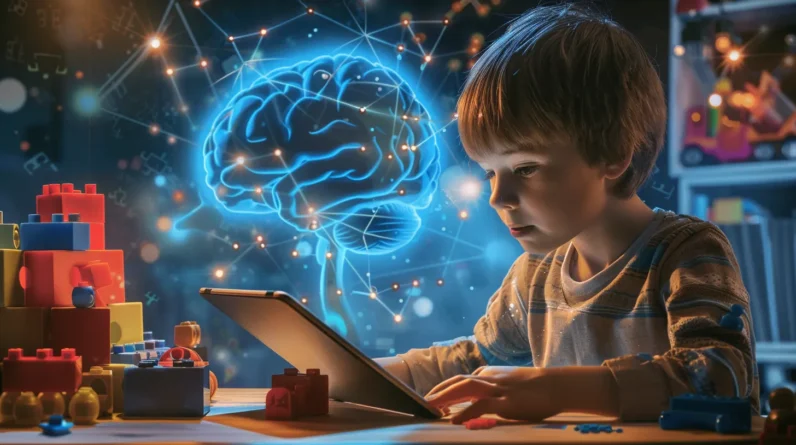
We’re exploring the connection between digital play and cognitive development, and research suggests that interactive digital media can greatly impact a child’s learning. Interactive games and digital play experiences can improve problem-solving skills, enhance creativity, and even raise literacy and math skills in preschoolers. As we continue to analyze the dynamics of digital play, we’re finding that effective digital experiences can optimize cognitive development and exploration skills. The quality of digital play and parental involvement are essential factors in reaping these benefits, and understanding these nuances can inform strategies for supporting childhood development.
Understanding Digital Play Dynamics
Within the domain of digital play, a complex interplay of cognitive, social, and emotional factors influences young children’s learning experiences. This dynamic interplay considerably impacts children’s engagement with digital devices, such as interactive games and apps, which can promote creativity, problem-solving skills, and emergent literacy.
Research indicates that effective digital play fosters exploration, encourages interactive experiences, and supports cognitive development. Parental involvement, including co-playing and discussing gameplay, plays an essential role in enhancing educational benefits and learning outcomes. By understanding these dynamics, we can harness the potential of digital play to optimize children’s cognitive development, exploration skills, and overall learning experiences.
Effective guidance can maximize the benefits of digital play, leading to improved learning outcomes in early education.
Cognitive Development and Digital Technology
Numerous studies have investigated the relationship between cognitive development and digital technology, shedding light on the potential benefits and risks of digital play for young children.
We’ve found that certain digital play experiences can be beneficial for cognitive development. For example:
– Interactive media, such as educational apps, can promote literacy and math skills, particularly among low-SES preschoolers.
– Touchscreen learning can facilitate cognitive growth and may be more effective than television for toddlers.
– Action video games can enhance specific cognitive skills, such as visual selective attention and spatial resolution.
These studies highlight the importance of considering the type of digital media and play experiences when evaluating their impact on cognitive development during the preschool years.
Impact of Digital Play on Learning
Digital play experiences are becoming an integral part of young children’s lives, offering a unique opportunity for learning and cognitive development.
We’re finding that interactive digital games can enhance cognitive development by promoting problem-solving skills and creativity. Educational programming, particularly when interactive, is also associated with positive cognitive outcomes, such as improved literacy and math skills.
Digital play can facilitate emergent literacy through interactive e-books and apps, supporting language development and comprehension. Engaging with educational digital media can lead to significant improvements in executive functioning skills. Digital play can enhance mathematical learning and cognitive flexibility, making it a valuable tool for supporting learning and cognitive development in young children.
Digital Literacy and Childhood Development
As we navigate the complexities of the 21st-century learning landscape, we’re coming to realize that digital literacy is an essential component of childhood development.
Digital play is a critical factor in this development, as it enhances cognitive skills, including problem-solving and mathematical learning. Interactive digital games induce a state of “flow,” linked to improved exploration skills and sustained engagement in learning activities.
Key aspects of digital literacy in childhood development include:
– Improved language development through parent-child interactions during digital play
– Enhanced literacy and math skills through educational programming and high-quality digital applications
– Better academic readiness, particularly for low-SES preschoolers, through targeted digital play interventions
Balancing Digital Play and Wellbeing
While excessive screen time is a growing concern for parents, it’s vital to recognize that digital play can be a valuable tool for cognitive development when balanced with overall well-being. Interactive digital games can induce a flow state in children, leading to positive outcomes such as improved exploration skills and enhanced creativity.
However, we must be mindful of the quality of digital play experiences. Effective educational apps should promote curiosity and self-discovery rather than focusing solely on structured activities. Parental involvement during digital play, such as co-playing and discussing game content, is also essential. Guided digital engagement can enhance language development and overall well-being in children.
Conclusion
As we conclude our exploration of the connection between digital play and cognitive development, we’re left with an essential understanding: digital play is not just a leisure activity, but a significant learning experience. Notably, a study by the Pew Research Center found that 98% of children under 8 years old have access to a mobile device at home. This statistic highlights the importance of embracing digital play as a tool for cognitive development and ensuring a balance between digital engagement and overall wellbeing.







